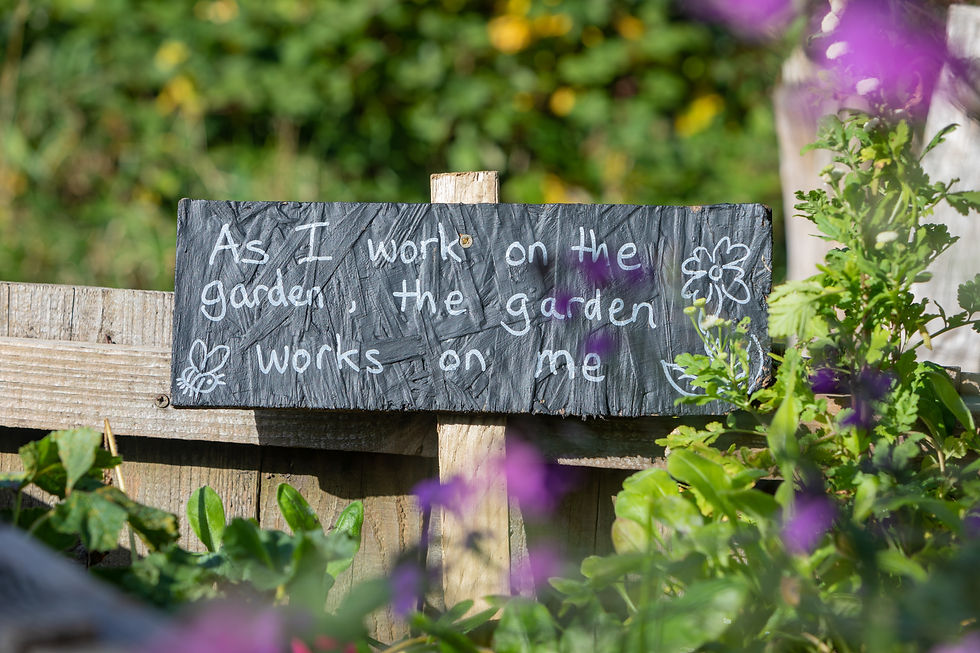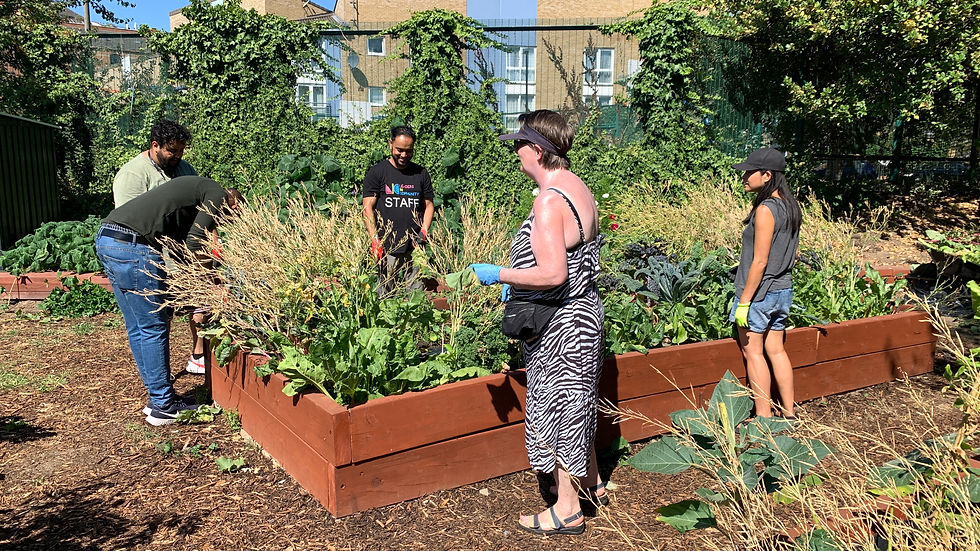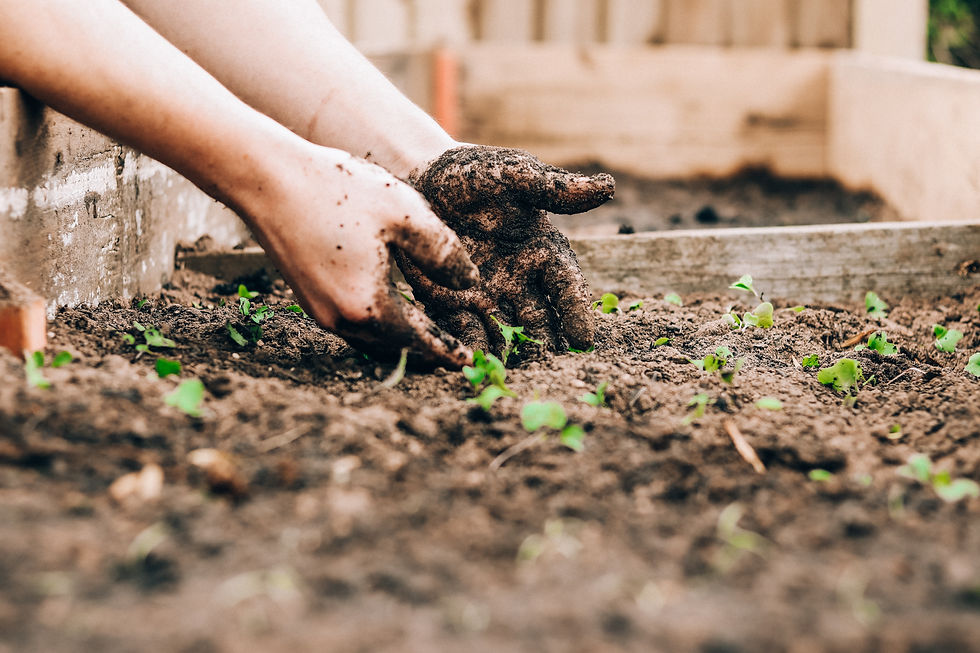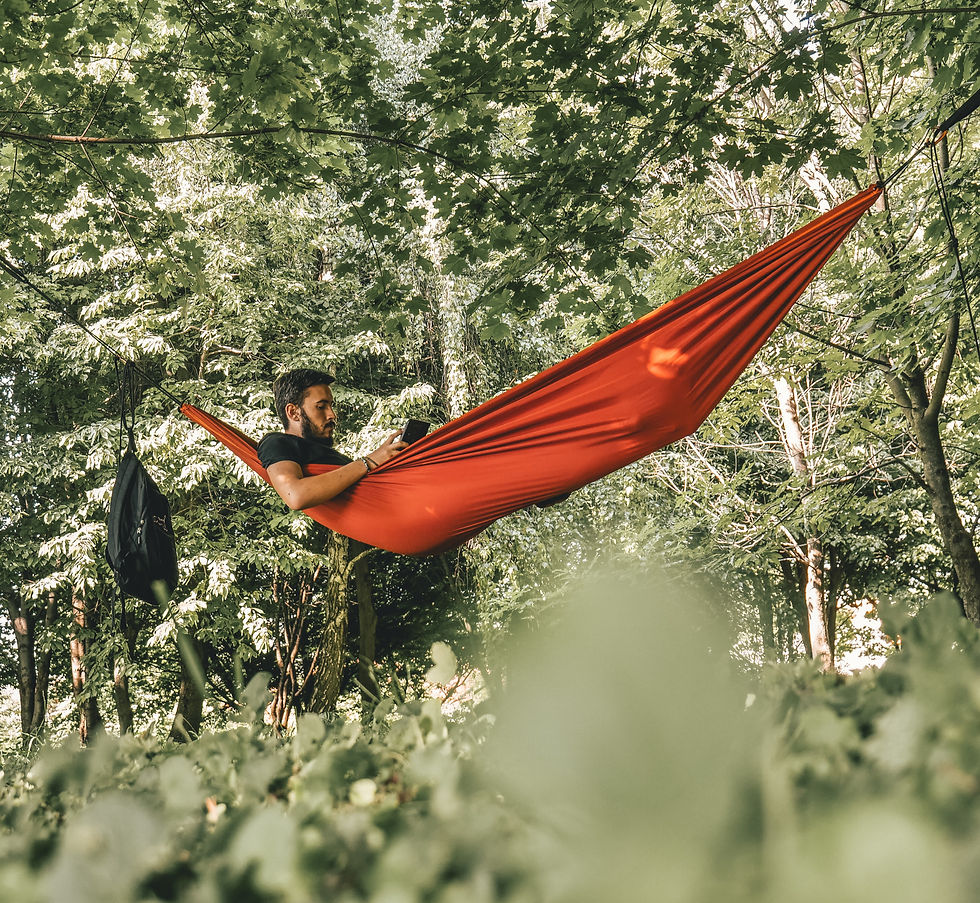The Hidden Benefits of Gardening
- info6250192
- Aug 16, 2022
- 3 min read

Gardening is well known for its benefits to the environment, surrounding wildlife and for providing colour and food harvests for the table. But gardening has other less well-known benefits too, whether gardening on a large scale or on a small windowsill.
The Multiple Benefits of the Outdoors
According to WHO (World Health Organization), 1 in 4 adults and 80% of adolescents in the world’s population do not get sufficient physical activity, most of who reside in countries such as the UK and parts of the USA. With Europeans spending 90% of their time indoors.
Gardening not only provides good levels of relaxing physical activity, but also gives us access to high levels of vitamin D. vitamin D is a fat-soluble vitamin that the body naturally produces when exposed to direct sunlight and is also found in certain foods and supplements. Vitamin D may help:
- Support the immune system.
- Growth and development of bones and teeth.
- Regulate mood.
- Feeling of alertness.

Digging for Health
There is still very much to explore, scientifically about the world of soil, so little is known. Animal and microbial life in the soil produce antibiotic compounds. And it’s these compounds, which are used by scientists, to form the basis of many antibiotics used by humans today. In just one gram of soil, there can be as many as one billion bacterial cells, with an estimated species diversity of 50,000 microorganisms.

It's some of this microbial life (Mycobacterium Vaccae), that’s said to stimulate serotonin production when inhaled during digging, that creates a positive link between humans and soil.
According to studies, digging in soil and touching soil may help with:
- Reducing depression.
- Reducing anxiety.
- Improve mood.
- Improve physical well-being.
- Possible weight regulation.
- Improving confidence and self-esteem.
Knowing the benefits and that it takes more than 100 years just to build 5 millimetres of soil, gives even more reasons to protect it from chemicals, contamination, industrialisation and erosion.
Connecting with Food and Health
The final product of gardening may be being able to enjoy a good harvest or relax in an array of colour display. But those colours, smells and flavours play another role, by way of stimulating the production of naturally occurring dopamine, causing a “feel-good” effect. Dopamine is a neurotransmitter (chemical messenger) in the brain, that can help with:

- Motivation.
- Boosting or retaining memory.
- Regulating mood.
- Regulating sleep.
- And regulating behaviour.
Speculation and theories are that this may be due to ancient basic hunter-gatherer instincts, when having to live off the land and choosing ripe foods and certain colours, would keep humans safe from harm, healthy and well-fed.
Some foods we grow and eat naturally contain and trigger the release of dopamine, such as:
- Bananas
- Avocado
- Beets
- Artichoke
- Seeds
- Cocoa

We can also get a boost of both dopamine and serotonin through being active in the garden.
Serotonin is another chemical message carrier, found mostly in the digestive system, made from amino acids found in various foods, according to Harvard Health, particularly in fruits and vegetables (as well as fish and seafood). Serotonin may help with:
- Blood clotting.
- Sleep regulation.
- Bone health.
- Nausea.
- Hormone balance.
- Regulating appetite.
Finally, we can’t talk about serotonin, without mentioning the benefits of Tryptophan foods. Tryptophan is an essential amino acid which the body uses to help make melatonin (responsible for the sleep wake cycle) and serotonin. It is found naturally in poultry and dairy, but to reconnect to the positive effects of gardening and the harvest, it can also be found in plant-based foods, such as:
- Leafy greens
- Peas
- Broccoli
- Seeds
- Mushrooms
- Soybeans
Roughly 1 to 2 hours of activity in the garden a day may help support body health by lowering cholesterol, supporting heart health, reducing stress hormone levels and support mental health. So, there are so many reasons to go outside, get messy and enjoy the balcony, garden and community growing spaces.

References:
Word Health Organization - Physical Activity
Garden Counselling - Groups and Self-Esteem
NHS - vitamin D
Science Direct - Why Gardening?
Harvard Health - Dopermine
Psychology Today - The Play Theory of Hunter-Gatherer Egalitarianism
Physician's Committee - Food and Mood PDF
Livestrong - 12 Foods High in Tryptophan for Better Sleep
ResearchGate - Identification of an Immune-responsive Mesolimbocortical Serotonergic System - PDF
Photos with thanks:




It’s amazing how gardening benefits go far beyond just growing food or flowers. I especially liked the part about soil microbes like Mycobacterium vaccae and their impact on our mood—it really shows how deeply we’re connected to nature.
Fascinating how soil microbes like Mycobacterium Vaccae can influence our mood while gardening. It really shows how connected we are to nature! Found another great resource here.